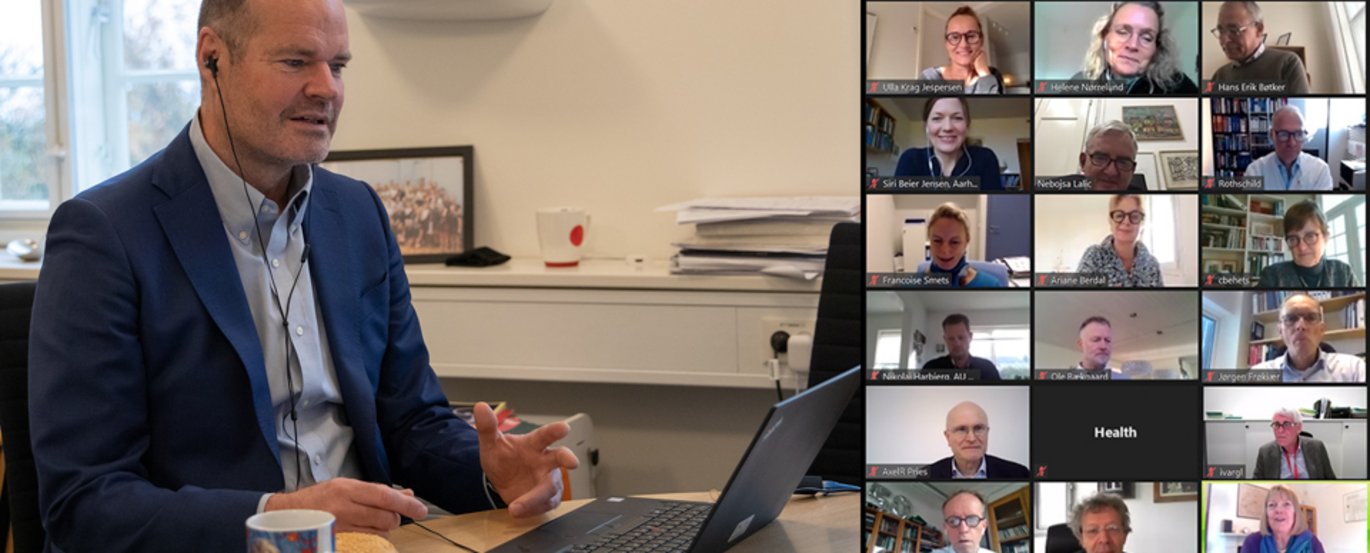The Advisory Board recommends...
A virtual visit from Health’s Advisory Board resulted in a number of specific recommendations. The shared agenda comprised four items: Internationalisation of the degree programmes, external funding, recruitment and gender equality. But the departments also received other advice along the way.

When Health’s international panel of advisers checked-in at the faculty last week, they did so in accordance with the current dominant meeting trend – on Zoom.
Members of the Advisory Board in seven European different countries were ready to provide inspiration and good advice about the strategic focus areas that are most in focus at the faculty right now.
One important focus area is the internationalisation of the degree programmes. One of the faculty's objectives is to have ten new summer schools in 2021 and to offer mobility scholarships and sabbaticals for teaching staff.
In its recommendations, the board suggested incentives for teaching staff, so that a period working or studying abroad is not only about finances, but also involves prestige. They also pointed towards the possibility of more courses and programmes in English, and an opportunity to invite exchange students into parts of the degree programmes.
However, at the same time there was acknowledgement that language is a challenge for exchanges, as major language areas such as German and French almost exclusively teach in their own language. The Advisory Board therefore agreed that elective courses and summer schools at Master's degree level are the most relevant places to establish a common, international study environment.
There was also broad support for the idea of joint exchange programmes for teaching staff, e.g. in the form of half-yearly sabbaticals or shorter visits of a few weeks, where teaching staff within specific subject areas get the chance to meet and inspire each other. But the message was also that it is important for activities abroad to give credit transfer and help with career-advancement.
In recent years, the faculty has had particular focus on external funding. The Advisory Board’s input for EU proposals included advice about how critical it is to have professional research support and to cultivate both academic and industry partnerships in plenty of time.
New norms for recruitment have long been on the faculty’s agenda, and the challenges when recruiting international employees include the requirement in connection with appointments in the clinical area that the person must be able to communicate in Danish. The Advisory Board also recommended maintaining focus on internal career opportunities.
One solution could be to appoint people solely to teach, which according to several members, is also a widespread practice in the UK.
Finally, gender equality was on the programme. Among the proposals to promote gender equality were focusing on the number of career years rather than age. Although another point was that management should be very clear in formulating expectations, both for the individual and for the workplace culture they wish to see. For example, this may involve not exclusively focusing on results, but also on how to create the results in collaboration with colleagues and contribute to the university's development – also called academic citizenship.
The Advisory Board’s advice to the departments
Department of Biomedicine
- A lot of praise for the entrepreneurship at the department.
- Evaluate the internal organisation and make sure there is cohesion with the clinical area
- Consider incentives in connection with teaching.
- Create even greater dynamics by making the department's management functions fixed-term positions.
Department of Clinical Medicine
- Continue the good work developing the Master's degree programme in medicine – and supplement this with a new Master's degree programme in neuroscience.
- Actively promote the help offered which can increase the department's EU funding.
- Focus on working to recruit more women in the clinical professorships.
Department of Dentistry and Oral Health
- Look for additional interdisciplinary research collaborations with other medical disciplines across the university and clarify the department's strengths.
- Involve international educational institutions in developing and integrating all the orofacial degree programmes – and share experiences as first movers with others who have the desire but not the courage to carry out mergers. Society as a whole is looking for what the department is doing.
- Expand the opportunities for collaboration at the department and utilise different competences – including those of the students – in the development of the degree programmes and in the teaching itself, e.g. with more blended learning and EDU-IT.
Department of Public Health
- Define what you understand by diversity, and apply the concept of diversity more broadly than just gender. Consider whether connecting diversity with inclusion is relevant.
- Invest in talent development, e.g. by developing programmes that can support the development of women's academic careers in particular.
- Reduce the scientific diversity at the department by e.g. consolidating some of the research units, so it is easier to position yourselves and to attract external funding. Involve employees in the process on an ongoing basis.
Department of Forensic Medicine
- Utilise new a contact with the Institute of Forensic Medicine at the University of Cologne which was arranged via the Advisory Board. The institute is comparable in size and setup and would be of value for sparring and reflection.
- Be better at applying for EU funding by establishing more collaborations with peers in other EU countries and, at the same time, be more creative in linking calls to forensic medicine.
- Team up with other forensic medicine companies in the Nordic region on common standards for quality in public sector consultancy and draw-up Scandinavian best practices.
Now is the time to follow up – both in the faculty management team and locally at the departments – on the recommendations from the Advisory Board. At the faculty's annual strategy day on 10 December, the recommendations will be included in the discussions of new initiatives within the faculty's focus areas.
